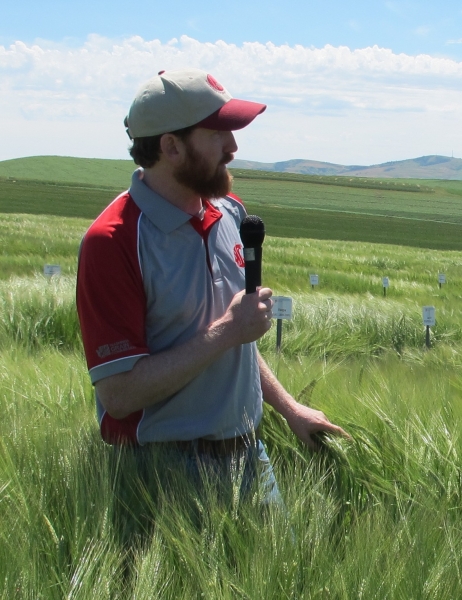West
Weed control with green manure and cover crops
Weeds pose one of the most important threats to crop production. Losses in both yield and quality of crops due to weeds, as well as costs of weed control, constitute an enormous economic problem in crop production. Weeds have a major influence on the production decisions made by producers. Additional land, labor, equipment, fuel, herbicides, insecticides, fungicides, fertilizer, and irrigation water may be required to maintain economical production when weeds are present.
OBJECTIVES
On-farm testing of organic weed control strategies in Indiana
Nashville, IN - In this on-farm study, organic vegetable producer Dale Rhoads tried out several organic herbicide materials and flaming in conjunction with a ‘stale’ seedbed to reduce the time and cost of hand-weeding leafy greens beds. The materials tested were Matran 5 (now reformulated and sold as Matran EC), two different vinegar solutions diluted to 13% and 10%, and Burnout II.
Cover Crops for Weed Management in Organic Vegetables
Development and Evaluation of Biologically-Integrated Conservation Tillage Systems for Organic Vegetable Production
A primary goal in developing environmentally sound and profitable farming systems has been to prevent soil degradation and erosion loss, and wherever possible, enhance soil quality through organic matter management. Conventional tillage practices currently used for vegetable production in the Willamette Valley involve from 5-8 passes over the field. For the past four years we have been working with vegetable growers in the Willamette Valley to develop an integrated system of vegetable production using winter annual cover crops and rotary strip- tillage.
Use of Walnut Hulls for Weed Control
Controlling weeds using propane generated flame and steam treatments in crop and non croplands
Conservation tillage and cover crop systems for organic processing tomato production (Year 2)
The production of organic processing tomatoes requires large inputs of organic sources of nitrogen. Besides the addition of compost, manure, and other organic amendments, leguminous cover crops, grown during the winter, are important sources of nitrogen for a subsequent tomato crop. Present management of cover crops for tomato production generally requires significant amounts of tillage that may retard the improvement of physical and chemical properties of the soil.
Organic Food Barley: Developing Nutritious and Delicious Varieties for the Pacific Northwest
 Researchers from Washington State University have been breeding and selecting hulless food barley types for almost a decade with the goal of releasing high yielding, nutritious barley varieties in this novel market class. Now in the final stages of this project, they will work to identify the advanced breeding lines most adapted to organic farmers in Washington State and Northern Idaho. In addition, the researchers propose to develop a truly comprehensive nutritional evaluation and a flavor profile of
Researchers from Washington State University have been breeding and selecting hulless food barley types for almost a decade with the goal of releasing high yielding, nutritious barley varieties in this novel market class. Now in the final stages of this project, they will work to identify the advanced breeding lines most adapted to organic farmers in Washington State and Northern Idaho. In addition, the researchers propose to develop a truly comprehensive nutritional evaluation and a flavor profile of
Developing "Organic-Ready" Maize Populations with Gametophytic Incompatibility: Year IV
 Maize (corn) is an incredibly productive and profitable crop that works well in organic crop rotations in many parts of North America. Since the release of transgenic (GMO) varieties of maize in the mid-1990s it has become increasingly difficult to grow uncontaminated organic maize or to find maize seed that is free of transgene contamination.
Maize (corn) is an incredibly productive and profitable crop that works well in organic crop rotations in many parts of North America. Since the release of transgenic (GMO) varieties of maize in the mid-1990s it has become increasingly difficult to grow uncontaminated organic maize or to find maize seed that is free of transgene contamination. 